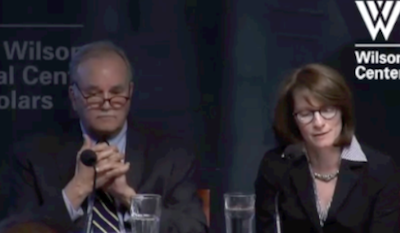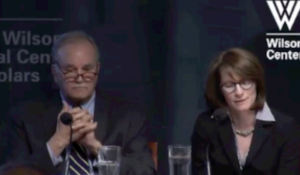BBG Watch
On April 30, 2015, BBG Watch published an opinion article by a former Voice of America (VOA) Senior National Security Correspondent who retired in 2012. In his commentary, Mr. Thomas analyzed and to a large degree criticized the recent study of U.S. international broadcasting conducted by a former Broadcasting Board of Governors (BBG) member S. Enders Wimbush and former Radio Free Europe / Radio Liberty (RFE/RL) executive Elizabeth Portale (Photo). Their study was based on interviews with prominent U.S. experts.
Mr. Wimbush and Ms. Portale have now written a rebuttal to Mr. Thomas’ article which we publish below.

The title of the Gary Thomas commentary, “Flying journalism under a false flag” was selected by BBG Watch from a key quote in his text since Mr. Thomas did not suggest a title. It generated a lively discussion.
Carolyn Weaver, a Voice of America correspondent, commented: “Thanks to Gary Thomas for eloquently stating what should be obvious to anyone with common sense: Not only is the brand of thumb-on-the-scale journalism that was promoted in the Royce-Engel legislation dishonest (and journalism that is not honest doesn’t deserve the name), it won’t even ‘work.’… So, the House bill, rather than “restore” VOA, will destroy its reputation and drive away the audiences it has. It is essentially a piece of legislation to create a vanity agency, a Potemkin kind of fake journalism that will waste taxpayers’ money and actually chip away at U.S. influence abroad. If policymakers truly want to reach and grow audiences, they will offer legislation that strengthens the firewall so that VOA journalism is protected from policy interference.”
An anonymous observer wrote: “These exchanges are interesting, in many ways informative, but please — spare us the sanctimony. … The perspective of many across the country, and importantly on Capitol Hill, is that VOA has fallen far, missed and mishandled many stories, failed to gain traction with its programming – notwithstanding a rosy picture painted by BBG/IBB and VOA management (especially in congressional briefings) about alleged increases in audience. … Public opinion is highly skeptical of government-sponsored media. Look at comments to articles about the news coverage and management disasters at BBG and VOA. A majority voice suspicion, and in some cases, derision, about government-run media and question why $750 million is still spent on maintaining these operations. In their comments here, critics appear to take little if any notice of this. To those who continue to insist that the news products at VOA, and other BBG entities have been unbiased – just stop it.”
Former BBG Governor S. Enders Wimbush and former RFE/RL executive Elizabeth Portale interviewed for their study former Secretary of State George P. Shultz, former chairmen of the Broadcasting Board of Governors, Marc Nathanson and Amb. James Glassman, former Voice of America directors Geoffrey Cowan and Robert Reilly, former RFE/RL President Dr. Jeffrey Gedmin, former U.S. Ambassador to Russia Michael McFaul, National Endowment for Democracy President Carl Gershman, former Freedom House President David Kramer, Dr. Francis Fukuyama, and several other prominent American scholars, diplomats, journalists and media experts. A panel discussion of the study took place at the Wilson Center on April 22, 2015, SEE DESCRIPTION AND FULL VIDEO.
A summary of the Wilson Center discussion with a shorter video (7:36) can be seen HERE.
The Gary Thomas opinion article and comments can be seen HERE.
Views expressed the rebuttal to Gary Thomas’ article are only those of the authors and not of BBG Watch, its volunteers, or sponsors.
Wimbush and Portale respond to Thomas on BBG reform
By S. Enders Wimbush and Elizabeth M. Portale
Gary Thomas is always thoughtful and passionate in defense of the journalism he practiced for many years. Few have pointed so consistently and accurately at the dysfunction in the current structure of U.S. international broadcasting, or at the consequences of allowing this dysfunction to fester. It is with great interest, therefore, that we read his assessment of our recently released study, a cri de cœur that largely validates our study, which, ironically, he calls “deeply flawed.”
We set out to advance the conversation on U.S. international broadcasting and the BBG, not by focusing on its failings, which are described elsewhere, but by asking the larger strategic questions of if and how U.S. international broadcasting is supposed to support America’s national interests; how it should or should not be attached to those interests; and how one might think about organizing U.S. international broadcasting to reflect that attachment. Thomas faults us for talking to so many “policy” experts, assuming apparently that no such attachment should be taken for granted. We plead guilty, but he should know better. It is inconceivable to us that anyone knowledgeable about where U.S. international broadcasting has been in the last sixty years or so and what it has done, or for that matter anyone steeped in the high language of the Voice of America’s Charter, could conclude that U.S. international broadcasting as a whole or the special place within it of its different networks is intended to be completely disconnected from America’s foreign policy objectives and interests.
We saw our task as reviewing how a diverse sample of individuals—all with some, often extensive or first order attachment to foreign policy thinking and strategy—addressed this question today. As we noted up front, as does Thomas, there was nothing “scientific” in this selection of individuals. For this, Thomas criticizes us for insufficient attention to “methodology.” But we did not intend to produce a Gallup-like summary of charts and graphs and probabilities. We saw such an approach as antithetical to creating the conversation we sought to encourage.
We wanted smart people to talk to us openly, and they did so. We are unpersuaded that allowing them to do so unimpeded in any way makes their contribution to our understanding of what U.S. international broadcasting should be less valuable. Thomas complains that we failed to list detailed questions that apparently would have lent our study some level of scientific consistency; that the quotes were unattributed, an omission we quickly ascertained was an indispensable condition of allowing our interviewees to speak freely—and which they asked for—and acknowledged up front; and that the study is “riddled with vague generalizations” about what they said and how they said it despite our clear explanations that we saw our task as summarizing the emerging narratives in a way that helped consumers of this work to understand where the conversations trended. Out of this came a rich conversation possessing powerful signposts to their chief concerns and recommendations.
Thomas proves beyond doubt that we did so effectively in his passionate defense of “pure” journalism, a subject that our interviewees raised repeatedly. This was a central and essential part of the conversation, and we are pleased that Thomas has joined it with such gusto. The role of journalism in U.S. international broadcasting—as an independent value and, hence, reason enough for U.S. international broadcasting to exist, or as a platform for expressing America’s wider range of values, interests, and aspirations—is not a new discussion, but it is one that needs to be revisited.
We can assume from Thomas’s provocative title to his rebuttal—“Flying journalism under a false flag”—that he believes journalism is its own flag. [BBG Watch: The title was written by BBG Watch from a key quote in Mr. Thomas’ article since he did not provide a title.] It is this attitude that evoked criticism from our interviewees, causing one to describe it as a “conceit” and “indulgence,” as we reported. Our interviewees, including some excellent journalists, did not agree with Thomas that the choice was between pure journalism and propaganda, a dichotomy he sets up unambiguously. Similarly he rejects the notion that the “firewall” between the interests of journalists and those of policymakers is overblown. Our interviewees, mostly from the policy side, but including journalists, were less categorical. If U.S. international broadcasting is to be fixed, these existential questions will require clear answers.
Thomas’s rebuttal to our study, the lively discussion at the Woodrow Wilson Center event that launched the study officially, the extensive media attention—and even the dispatch of an anonymous BBG official to tell the media that the study contains nothing new, just tired complaints—are evidence that the conversation has been deepened, and we are pleased about that. However, Thomas’s occasional descent into conflating our personal views with those of our interviewees is unfortunate and inaccurate, as is the reaction from some that the views in the study are ours alone. We were surprised repeatedly by some of the views we heard, and by the ardor with which they were expressed. This, too, we noted in the study. We anticipate that the volume of this conversation will increase, that others will join the discussion, and that some of the essential questions of U.S. international broadcasting’s mission, content, and operations flagged by our interviewees will have to be addressed as the backbone of any reform.

